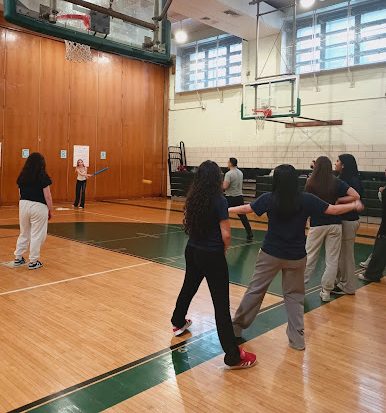Many people are concerned about fake news, and rightfully so. False narratives can be dangerous, especially when they become widespread. Yet more than just content can be misleading in news articles; The word choice and sentence structure that reporters and journalists use can also impact the readers’ takeaways, and when the press is who the people look to for non-biased information, this can also be dangerous.
One example of misleading word choice and syntax often used by journalists is passive voice. The Writing Center at UNC-Chapel Hill describes passive voice as “when you make the object of an action into the subject of a sentence. That is, whoever or whatever is performing the action is not the grammatical subject of the sentence.”
This happens in press coverage of many topics, but generally, the reporting is on some form of violence, whether it is an individual case or a larger conflict. In these cases, it takes the perpetrator away from the act and focuses on the effect. Here are some examples you may have seen in headlines, “this many dead”, “victim dies in shooting incident” or “woman raped” instead of “ … killed this many”, “… shot and killed” or “… raped woman”.
Why does it matter? Passive voice headlines rephrase sentences in a manner that shifts the focus – and often subsequently the takeaway.
Look at the first example of a passive headline in contrast with an active one. The passive version could be “17 Dead After Attack on Building.” This headline leaves a concerning amount of information out. What kind of attack was it? Who is responsible? If that information is known to the reporter, it should be their responsibility to write the headline in a way that informs their readers of what the passive headline didn’t include. That headline could be “Man Bombs Building, Killing 17.” Not only does that communicate that the action and the person/people who carried it out are known, but it emphasizes the action was taken, it didn’t just happen.
In the second instance, “victim dies in a shooting incident,” the same issue of taking the perpetrator, in this case the shooter, out of the headlines takes place. This example also uses the words “shooting incident,” which makes it unclear what actually happened. How many people had guns and fired? “Incident” is also something to be wary of, as it leaves information out and has certain implications that should be absent from the headline. Incidents can be accidents or intentional, and they can be minor or incredibly serious. In headlines, “incident” could be used as a substitute for a word that gives more accurate information.
In the last example, “woman raped” in place of “…rapes woman,” the problems with the previous passive headlines happen again, yet this language is used incredibly often in headlines about violence against women, whether its rape or murder. In this example, and the ones previous, there is a risk of normalizing these kinds of violence by using the passive voice. By decentering the aggressor, it is phrased as though these things “just happen,” which is obviously untrue, and can be used to almost desensitize audiences to the actions and their effects. Additionally, they allow for a separation between the action and the person who took it. Rape doesn’t just happen to people, people rape. People obviously die of things other than murder, but they don’t die of murder, someone murdered them. See the difference?
That isn’t to say that passive voice should never be used. Using a passive voice can be appropriate, even necessary, in certain situations. If information is unknown while the article is being written, passive voice can be used to avoid drawing conclusions that can’t be relied upon. Another defense of passive voice is that it keeps headlines objective. However, in cases of violence where enough information is known, the usage of the passive voice in headlines does push a narrative – one that the press should be avoiding.




























Isabella Wailes • Dec 12, 2024 at 9:05 am
I love your choice of words for this writing piece; it set the tone for the rest of the article, and the detailed descriptions flowed well.
Bea • Dec 10, 2024 at 9:22 am
I really like how you give different examples and explain them, it really helped me understand what your were trying to say. Great Article!
JoyImani • Dec 10, 2024 at 9:01 am
I think this work is very well written and well thought about. This article gives me a lot of information about people’s voice and writing and helps me understand more about passive voice. In addition the short paragraphs make me want to keep reading and not get tired of reading just a long essay. Good article.
Lily Stamas • Dec 10, 2024 at 9:01 am
I loved your writing style and how beautifully you explained your points. I also appreciate adding your first example of the Olympic sprinter because it hooked me in and made me better understand your topic and why you were writing about it. All of your examples and re-written headlines were great. Amazing job overall!!
Sarah Zadok • Dec 10, 2024 at 8:59 am
I think that the use of asking the reader questions is very powerful because it really makes them think about the situation for themselves rather than just reading what the writer is saying.
amitai • Dec 10, 2024 at 8:58 am
I like how She gives multiple examples to help her audience find this unique bias in other texts. another thing I like that Moriarty did was she was not afraid to come after real news outlets and headlines along these lines. I’d say she certainly made her case to me!
crxveryy • Dec 10, 2024 at 8:56 am
I really like how you use this to represent fake news!!! keep up the good work!!!❤️
Baron • Dec 10, 2024 at 8:55 am
I really liked how descriptive you were in specific examples, not holding back from the impact of changing such a brutal situation.
Kieran • Dec 10, 2024 at 8:55 am
I love how this story is a compelling analysis of how a passive voice in journalism can shape perception, particularly when it comes to reporting violence.
Jane rosenthal • Dec 10, 2024 at 8:54 am
I was very hooked in with the start when you explained what the problem is and why it’s a problem, so that I’m interested and want to keep reading for when you explain it later in the article. personally I have never thought about this issue of passive voice when looking at titles of headlines but reading this really opens my eyes to how much of an issue this is and how much journalists are leaving out. Great job!! -Jane Rosenthal